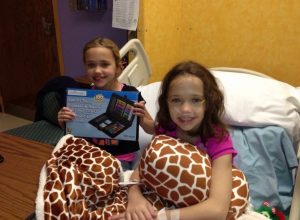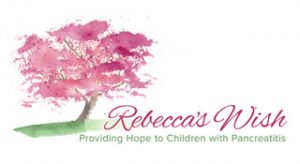

Hi! I’m Alyssa Hanshew and I am seventeen-years old. I was diagnosed with my first pancreatitis attack at an early age. Little did my parents know that we had a very long road ahead of us. From the moment of my first chronic pancreatitis attack all up until I was eleven-years old, all I’ve ever known has been a life of hospitalizations, take your medication, get sleep, and always, tell your parents when your stomach hurts. The hospital simply was my second home growing up.
Most of my childhood memories involve either my health or the hospital in some way. I guess you could say that I never have had a “normal” life. There have been times throughout my life where I’d have to stay in my room and rest, while I overheard my neighbors and sisters playing outside or I’d miss a graduation, another dance recital, a debate tournament, holidays, and sometimes even my own birthday – due to this menace of a disease that not only plagued my entire childhood, but still effects me every day. There are moments when I lay in bed and even the slightest movement feels like a dump truck is parked in front of me and pouring tons of bricks all over me. There are moments when I’m at school where I left three classes out of my eight where I went to go get sick in the bathroom. There are moments where I am walking down a hallway and have to sit down and wait a moment because of the abdominal pain. And there are times where I have to force myself to eat food, despite the fact that I’ve gotten sick twice that day and have the feeling that that number will just increase.
When I was asked to write about what it was and still is like having this illness, it felt like my brain was in overdrive with all the ideas that rushed into my head at that moment.
When I was asked to write about chronic pancreatitis, one thing in particular stood out to me. And “it’s” the one thing that is only talked about behind closed doors. “It’s” the thing that no one can find out about, or else you’ll be looked at or treated differently. And “it’s” the thing that is ignored. And “it” is the mental and emotional toll it has on not only the patient, but the loved ones of the ill.
I have been diagnosed with Post Traumatic Stress Disorder, along with depression and anxiety, all of which are byproducts of by long struggle with pancreatitis. And I’m no longer afraid to admit that I also face these daily struggles and I won’t deny that I suffer from these illnesses due to the trauma that I’ve experienced and still do experience with my health. I won’t put on the persona that I am a “perfect” or “healthy” teenager. Because I’m not, and that’s okay. I have my good, my bad, and my better days. And that’s okay. It’s okay to not be fine. What’s not okay is refusing to acknowledge the problem at hand: the lack of mental and emotional support for the chronically ill children. When I say the only reason that I came forth about my own struggles was to prove that there is stigma discussing psychological illnesses which manifest from physical diseases, I mean that. And I think I was so scared because it has been engraved into today’s society that mental illness is something that you should be a marker of shame. But as I’ve grown, as I’ve learned, and as I’ve listened, that isn’t the case. It’s okay to be ill. It’s okay to not always be okay.
I remember one time when I confided in a friend about my day-to-day struggles, they looked at me and asked, “Why do you keep fighting?” And the answer is simple. I fight for my family. I fight for my friends. I fight for change, and lastly, I fight for myself. And if any of you who are reading this consider my struggle to be similar to your own – I applaud you. For you have made it another day. You are here for another day on this Earth, and that in itself is an accomplishment, and I am proud of you. The world isn’t always happiness and smiles, trust me, I know.
But there’s always rain before the rainbow.
You’ll be okay.
So, for now on, when I’m asked, “What was it like growing up like this?” or “What is it like living with bad health?” I will no longer shake or shiver in my shoes while the fear of being honest for once consumes me.
I will stand up, and admit that it’s hard. Then I’ll acknowledge that it is okay for it to be hard.
Because it is.
In order to see change, you must admit that there is a need for change. And that’s what I’ll continue to do until changes have been made. And I encourage everyone else to do the same.
Love,
Alyssa M Hanshew


3 Comments
Great read sweetheart. I have been following you for years. My son Cam has suffered the same. It is always good to hear you are not alone. You are an inspiration. God bless you and your family!
Well written. Very proud of you!
My husband suffered from familial pancreatitis which manifested at age 25. His pancreas was removed at age 37. He lived to age 68 with no pain. Of course he had diabetes and the effects of that. Our 3 sons had pancreatitis at the ages of 5 and all three had a rue n y surgery to cut off the tail of the pancreas and reroute intestines. They have not suffered from pancreatitis since their operations and the oldest is 48. I don’t understand why doctors don’t know much about this. Also have other family members with this problem. I wish everyone could be helped like mine were. I hope your organization gives more awareness and you are healed by God completely.